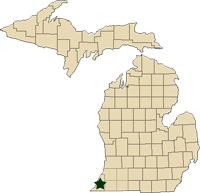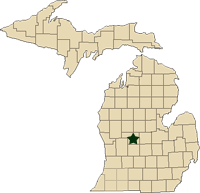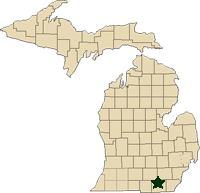Regional reports on Michigan vegetables – July 25, 2012
MSU Extension educators’ pest and vegetable updates for Michigan.
This week’s regional reports:
- Southwest Michigan – Ron Goldy
- Central Michigan – Fred Springborn
- Southeast Michigan – Lina Rodriguez Salamanca
Southwest Michigan – Ron Goldy, Michigan State University Extension
|
Weather
Temperatures for the period were above average with highs from 82 to 94 degrees Fahrenheit and lows from 59 to 74 F. Since May 1 we have had 24 days over 90F. Generally, we only have 12 all season. During one period we had seven continuous days above 90 F. The area did receive much needed rainfall with a general average of 1.75 inches. Even with recent rains, conditions continue to be dry with non-irrigated fields showing significant stress.
Crop reports
Dry soil inhibited weed seed germination, but recent rains will encourage their growth and post-plant herbicides probably won’t control them this late in the season. Growers should expect to see an increase in weeds.
Mites continue to be a problem in vine and solonaceous crops. Control products are limited in crops such as zucchini and yellow squash that are harvested daily. Pay attention to preharvest intervals. Aphid populations are also increasing in peppers.
Hot weather has caused more male than female flowers in pumpkins and fall squash. Cooler temperatures should bring on more female flowers. Early planted pumpkins already have orange fruit and growers should consider removing the fruit to encourage the plants to produce more flowers. Virus symptoms are also increasing in most vine crops.
Downy mildew has been confirmed in the area, so cucurbit growers, especially cucumbers, need to make sure their crops are adequately protected.
Potatoes are senescing early, but regrowth is occurring at the base of the shoots. Some potatoes planted in early May still have not set tubers due to the heat. Leafhoppers are present.
Poor growth has been observed on late-planted tomatoes and peppers. This is due to the heat stress from not only the air temperature, but also the soil temperature under the plastic. Roots do not like high temperatures so when transplants are set in hot soil the roots do not grow to support the plant. Eventually, the small plant will set fruit and its chances of reaching full size are not good.
Central Michigan – Fred Springborn, Michigan State University Extension
|
Weather
The welcomed rain last week followed by seasonably warm and dry weather this week has given some relief to many parts of the region. There are still areas such as several near the Saginaw Valley that did not receive as much moisture as western and southern Michigan experienced last week. In those areas, many crops are still stressed. All unirrigated areas still have soil moisture deficits down through the soil profile in the lower root zone. High air temperatures ranged from the low 70s last Wednesday (July 18) to the upper 80s toward the end of the week.
Crops
Potato vines in several fields are collapsing sooner than what is optimal. Bacterial vine rot, botrytis blight and issues related to this season’s unusual weather are behind much of the decline in vine health. Late season weed control will likely be of concern in some fields. Colorado potato beetles are present in all life stages. While there have not yet been any reports of late blight in Michigan, it is important that growers maintain preventative fungicide applications.
Summer squash and zucchini harvest is continuing with fruit growing rapidly.
Pickle harvest is underway with fruit developing rapidly. Mites are present in some areas.
Western bean cutworm pheromone trap catches continue to taper off, but we are still catching significant numbers. My trap in Stanton, Mich., which is checked daily, is catching three to five moths per night for a total of 354 this season. Scout sweet corn for western bean cutworm egg mass if at or near tassel emergence, especially if the planting is not receiving insecticide treatments for European corn borers or corn earworms. We continue to catch low numbers of corn earworms.
Japanese beetle adults are making their presence known. Monitor sweet corn as well as other susceptible crops. While I have not seen significant silk clipping before pollination in either sweet corn or field corn, I have observed high numbers of Japanese beetles congregating on corn ears, causing aesthetic injury to ears and ear tips, which may be of concern to sweet corn and ornamental corn growers.
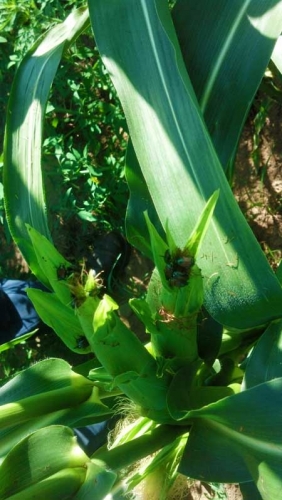
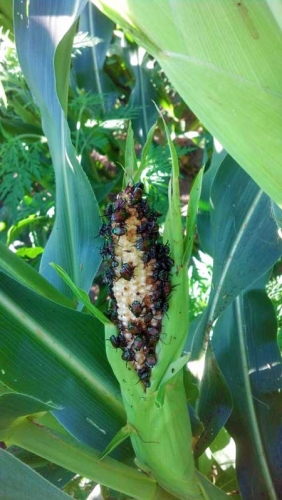
Japanese beetles congregating on corn ears, causing injury to ears and ear tips.
Potato leafhopper adults and nymphs are present in significant numbers. Scout dry beans and snap beans for this pest, especially near alfalfa fields during alfalfa harvest
Southeast Michigan – Lina Rodriguez Salamanca, Michigan State University Extension
|
Weather
The counties in southeast Michigan have severe drought according to the U.S. drought monitor. Wayne County has moderate drought.
|
County |
Station |
Temperature |
Rainfall (in) |
||||
|
Min. |
Average min. |
Max. |
Average max. |
July 18-24 |
Total rainfall since Jan. 1 |
||
|
Lenawee |
54.3 |
63.8 |
91.9 |
87.6 |
1.1 |
11.59 |
|
|
Monroe |
48.3 |
62.1 |
94.9 |
89.4 |
0.33 |
11.67 |
|
Relative humidity at the Hudson Enviro-weather station ranged from 34 to 94 percent with 9 to 14 hours of wetness at the Hudson station. The Petersburg Enviro-weather station ranged from 28 to 94 percent with 5 to 10 hours of wetness. These values are very important for disease development.
Crops and pests
Pollination and abundant fruit set has been observed in cucurbit crops. Zucchini, yellow squash and melon harvest continues and some fields are coming to an end. Pumpkins are setting fruit. Squash bugs have been causing some damage on pumpkins. One squash vine borer moth was found in the Washtenaw County trap and two were found in the Monroe County trap.
In the Monroe County spore trap, cucurbit downy mildew counts decreased after reaching 20 spores per hour last week. Two counties have confirmed reports of cucurbit downy mildew. See Downy mildew outbreak on cucumbers in southwest Michigan for more information.
Table beets with Rhizoctonia root and crown root were found on a field in Lenawee County. This is a common disease in sugarbeets.
Tomatoes and peppers are bearing fruit. The risk for late blight is moderate since we had high humidity and mild to high temperatures in our area during the rainy days. See the Late Blight Risk Monitoring website to get a personalized recommendation based on your planting date.
Sweet corn harvest continues. The risk of western bean cutworm is high in our area according to www.insectforecast.com. The count of insect pests in the Monroe County traps was 16 corn earworms (12 caught on July 20 and four on July 24), two European corn borers and six western bean cutworms (four caught on July 20 and two on July 24). Monitoring will continue. Keep up-to-date with the count at Corn earworm in sweet corn trapping map for July 16-22, 2012.



 Print
Print Email
Email